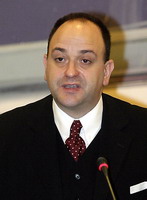- Serbia
Get to know Serbia
- Citizens
Culture and science
Health services
Pension and disability insurance
- Business
Employment
Economy
- Media
- Government
- Contact
Keep in touch
Contact form
Back
Keepin touch
Whether you have a question, comment, suggestion or any problem in the purview of the government, send us your message and we will try to respond as soon as possible. If your problem is not in our purview, we will forward your message to the relevant institution.
Q:
A:
Feasibility Study - admission to negotiations on EU association
Belgrade,
16 March 2005
In an interview for the latest edition of “E Magazine” Serbian Minister of International Economic Relations Milan Parivodic said that he expected this country to conclude the Agreement on Stabilisation and Association with the EU in the first half of 2006.
Parivodic said that this would be a period of true reform, as great efforts must be exerted in adapting our economic system and legal norms and those standards that must be fulfilled by countries which conclude this agreement with the EU.
The minister explained that the Feasibility Study confirms a country’s ability to enter into stabilisation and association negotiations with the EU. It is, in essence, a green light for negotiations, which follow immediately after receiving a positive assessment, stated Parivodic. He underlined that enormous expert and administrative capacities need to be engaged to complete those negotiations.
Parivodic went on to say that those reforms are for the country’s own benefit and coincide with Serbia-Montenegro’s accession to the World Trade Organisation.
According to him, nearly all economic parameters achieved in economic policy in 2004, as well as in this year, were, with slight differences, assessed as very good by certain European expert circles. The greatest problem is the significant foreign trade deficit, about $7.5 billion last year, which is the chief objection of the International Monetary Fund, but this is the consequence of structural problems in the economy. Parivodic explained that there is an abundance of state and publicly owned companies and that private companies make up a far smaller share of the economy. He pointed out the debt write off by the Paris and London clubs, the sixth arrangement with the International Monetary fund that is expected in the first half of this year and the first B plus rating of the overall economic situation as government successes that should not be hampered by unforeseen obstacles that might derail these results. He also noted the increasing level of cooperation with the Hague tribunal as important, especially as it concerns the feasibility study.
The minister explained that the Feasibility Study confirms a country’s ability to enter into stabilisation and association negotiations with the EU. It is, in essence, a green light for negotiations, which follow immediately after receiving a positive assessment, stated Parivodic. He underlined that enormous expert and administrative capacities need to be engaged to complete those negotiations.
Parivodic went on to say that those reforms are for the country’s own benefit and coincide with Serbia-Montenegro’s accession to the World Trade Organisation.
According to him, nearly all economic parameters achieved in economic policy in 2004, as well as in this year, were, with slight differences, assessed as very good by certain European expert circles. The greatest problem is the significant foreign trade deficit, about $7.5 billion last year, which is the chief objection of the International Monetary Fund, but this is the consequence of structural problems in the economy. Parivodic explained that there is an abundance of state and publicly owned companies and that private companies make up a far smaller share of the economy. He pointed out the debt write off by the Paris and London clubs, the sixth arrangement with the International Monetary fund that is expected in the first half of this year and the first B plus rating of the overall economic situation as government successes that should not be hampered by unforeseen obstacles that might derail these results. He also noted the increasing level of cooperation with the Hague tribunal as important, especially as it concerns the feasibility study.
-
 Belgrade/Brussels, 19 November 2025
Belgrade/Brussels, 19 November 2025European integration shared responsibility of entire society
-
 Belgrade, 29 October 2024
Belgrade, 29 October 2024State moves to minimise advertising for betting shops
-
 Belgrade/Berlin, 28 January 2016
Belgrade/Berlin, 28 January 2016Fences cannot stop migrations
-
 Belgrade, 7 January 2016
Belgrade, 7 January 2016Serbia to experience dynamic economic growth in 2016
-
 Belgrade, 31 December 2015
Belgrade, 31 December 2015Serbia will persevere on path of development, reforms
-
 Belgrade, 30 December 2015
Belgrade, 30 December 2015Ground for Serbia’s progress set
-
 Belgrade, 28 December 2015
Belgrade, 28 December 2015Serbia ready for improvement of cooperation with Russia
-
 Belgrade, 22 December 2015
Belgrade, 22 December 2015Serbia ready to open six more chapters next year
-
 Belgrade, 21 December 2015
Belgrade, 21 December 2015Serbia to be part of EU by 2020
-
 Belgrade, 20 December 2015
Belgrade, 20 December 2015Serbia ready for EU membership by 2019


